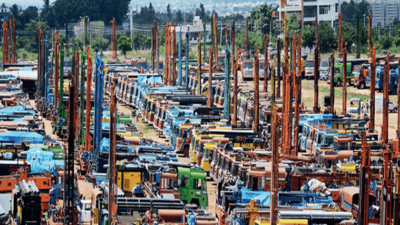Top Searches
- News
- City News
- bengaluru News
- Bengaluru groundwater levels critical
Bengaluru groundwater levels critical

As per the state water policy 2022, nearly 56% of Karnataka’s agricultural water requirement is met through groundwater resources. Bengaluru Urban has obtained the highest NoCs
BENGALURU: While the state cabinet recently approved the water policy 2022, aimed at catering to Bengaluru's potable water requirement and ensuring safe, pollution-free groundwater, the government has hardly regulated the digging of borewells or cracked the whip on thousands of illegal borewells that are dug up daily. This despite the city exhausting its capacity to draw water from the ground.
The Karnataka Ground Water Authority (KGWA) is the official agency to keep a check on the actual number of borewells in the city and other parts of the state, but lack of guidelines and powers has crippled its operations.
"Most of the borewells are meant for irrigation and domestic consumption. We only regulate and charge industrial and commercial borewells. Given the overexploited condition of Bengaluru, we should not allow any more drilling of borewells at least for a couple of years. But if we start strict enforcement, it can only turn into ugly confrontations," explained a senior engineer from the minor irrigation department.

Surprisingly, the number of borewells registered with KGWA and the energy department doesn't tally. As per the energy department records, Karnataka has about 32.5 lakh borewells. KGWA records, meanwhile, say there are only 14,240. In fact, in several cases, the government itself has dug up borewells under various schemes despite being aware of the fact that the city doesn't have the required quantity of groundwater.
"We are only regulating borewells dug up by industries and not going after domestic borewells or irrigation pump sets. If the government asks us to crack the whip on them, we will serve them notices to comply with registration rules and charge them as per their usage," an engineer explained.
Data from KGWA shows Bengaluru Urban obtained the highest NoCs for 89 borewells, followed by Ramanagara (63), Bengaluru Rural (33), Ballari (20) and Mysuru (19).
According to officials, ever since the government enacted the Karnataka Ground Water (Regulation and Control of Development and Management) Act 2011, they have been instructed to check for illegal borewells only in industrial and commercial use areas and charge industries for extraction of groundwater.
"Until the government provides every citizen with the required quantity of water, it cannot enforce any restriction on extraction of groundwater for domestic purposes. It would amount to violation of fundamental rights. Just like air, you cannot tax water as it is the right of every individual," a former irrigation secretary and water expert said.
As per the state water policy 2022, nearly 56% of Karnataka's agricultural water requirement is met through groundwater resources.
"The alarming depletion of groundwater and gradual pollution of the groundwater table are equally concerning and require immediate attention. With Bengaluru fast expanding in all directions, the government needs to focus on harnessing wastewater, surface water, out-of-the-basin water arrangement and groundwater," the policy states.
The Karnataka Ground Water Authority (KGWA) is the official agency to keep a check on the actual number of borewells in the city and other parts of the state, but lack of guidelines and powers has crippled its operations.
Times View
The exponential growth of Bengaluru city has translated into enormous use of groundwater. Not only residents, even the agriculture sector has overexploited reserves to feed the city. Given the poor quality of river water, groundwater is the only source of safe water in most cases. Prudent use of the precious resource is the need of the hour, and authorities must regulate largescale exploitation through stringent regulations and strict enforcement.
"Most of the borewells are meant for irrigation and domestic consumption. We only regulate and charge industrial and commercial borewells. Given the overexploited condition of Bengaluru, we should not allow any more drilling of borewells at least for a couple of years. But if we start strict enforcement, it can only turn into ugly confrontations," explained a senior engineer from the minor irrigation department.

Surprisingly, the number of borewells registered with KGWA and the energy department doesn't tally. As per the energy department records, Karnataka has about 32.5 lakh borewells. KGWA records, meanwhile, say there are only 14,240. In fact, in several cases, the government itself has dug up borewells under various schemes despite being aware of the fact that the city doesn't have the required quantity of groundwater.
"We are only regulating borewells dug up by industries and not going after domestic borewells or irrigation pump sets. If the government asks us to crack the whip on them, we will serve them notices to comply with registration rules and charge them as per their usage," an engineer explained.
Data from KGWA shows Bengaluru Urban obtained the highest NoCs for 89 borewells, followed by Ramanagara (63), Bengaluru Rural (33), Ballari (20) and Mysuru (19).
According to officials, ever since the government enacted the Karnataka Ground Water (Regulation and Control of Development and Management) Act 2011, they have been instructed to check for illegal borewells only in industrial and commercial use areas and charge industries for extraction of groundwater.
"Until the government provides every citizen with the required quantity of water, it cannot enforce any restriction on extraction of groundwater for domestic purposes. It would amount to violation of fundamental rights. Just like air, you cannot tax water as it is the right of every individual," a former irrigation secretary and water expert said.
As per the state water policy 2022, nearly 56% of Karnataka's agricultural water requirement is met through groundwater resources.
"The alarming depletion of groundwater and gradual pollution of the groundwater table are equally concerning and require immediate attention. With Bengaluru fast expanding in all directions, the government needs to focus on harnessing wastewater, surface water, out-of-the-basin water arrangement and groundwater," the policy states.
FOLLOW US ON SOCIAL MEDIA
FacebookTwitterInstagramKOO APPYOUTUBE
Start a Conversation
end of article










